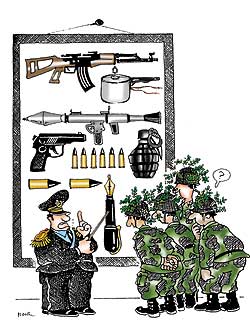 In the current politically charged atmosphere, one reality is self-evident: almost no one is playing by the rules. Internal party rules are being bent by this or that faction, underground Maoists operate as outlaws, even constitutional provisions are being challenged.
In the current politically charged atmosphere, one reality is self-evident: almost no one is playing by the rules. Internal party rules are being bent by this or that faction, underground Maoists operate as outlaws, even constitutional provisions are being challenged. In this legal limbo of the state of emergency, there are actually very few rules. And those that exist pertain to what you can't do, rather than what you can. Most rights of individual citizens are on hold. This is when the truth becomes subversive to those who have a lot to hide. Yet, it needn't be.

War strategists have long held that information-believable and credible information-is a weapon to win the battle for public opinion. There is a whole subject they teach at war schools on information warfare. Propaganda, they tell you, is effective only when it doesn't sound like propaganda.
The biggest asset of the government in this time of emergency is its near-monopoly on information. However, it is very easy to make this monopoly futile-by a self-perpetuating perception that official information is not plausible. It is not incredible, therefore, that news today lacks credibility. You'd have thought that our info-mandarins would have learnt from the mistakes of the past, but no such luck. Going by the coverage of the current party-government feud, the official media is behaving like the mouthpiece of the party-in-power.
And then there is the Defence Ministry's daily faxed statements to the media. Most of its contents are probably true, but they lack the presentation that lends them credence. It is not what is said, but how it is said-either the sterile daily listing of war dead and captured material, or television pictures of piles of decomposed corpses so gruesome that the footage shocks even the battle-hardened.
The result is that a sceptical public, conditioned by 30 years of unfreedom, focuses on what is not said rather than on what is said.
There could be nothing more wasteful than this squandering of the public trust when that trust is a vital hearts and minds tool.
More than six months after the imposition of the state of emergency, it is becoming increasingly clear that the government (or what is left of it) needs to show greater media savvy. We don't expect it from the Maoists, since we know that they are for totalitarianism, all or nothing. They have proved time and again that the punishment for disagreeing with the party line is banishment to the gulag of the hereafter. It is logical, therefore, that anyone fighting the Maoists must be against totalitarianism and on the side of democracy and a free press. We cannot use their tactics.
Banning the truth doesn't make it disappear. Free speech is not truly free if you are only allowed to say nice things. The government may not like what the media says, but it must protect our right to say it. Otherwise, what are we fighting for?


